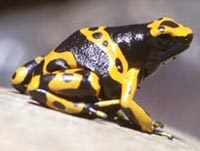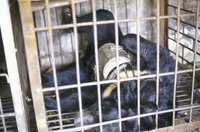How the southern gastric brooding frog (Rheobatrachus) in Australia went extinct before research in gastric-related illnesses could be carried out.

Extinct southern gastric brooding frog halts research. Thanks to a kind of frog that can no longer be found, millions of people suffering from peptic ulcers have lost a chance to heal better.
The southern gastric brooding frog (Rheobatrachus) discovered in the Australian rainforests in the 1980s intrigued scientists with its ability to raise its young in the stomach where enzymes and acids could have digested them instead. This amazing fact led to preliminary studies that the baby frogs produced substances that inhibited acid and enzyme secretions.
As the frog has gone extinct, the research stopped prematurely. “The valuable medical secrets they held are now gone forever,” say Eric Chivian and Aaron Bernstein, key authors of newly released Sustaining Life: How Human Health Depends on Biodiversity.
Since time immemorial, plants and animals have provided solutions to many of mankind’s quest for health by learning more about how they live and stay alive in spite of unusual factors. It has now unfortunately become increasingly difficult for research in natural medicinal sources due to the critical reduction of biological diversity.

Metal brace, or clamp, holds this struggling bear in place. The head of United Nations Environment Programme Achim Steiner describes the rate of biodiversity loss as reaching “dramatic proportions”. “Human activity, environmental impacts, climate change and loss of biodiversity have led to the loss of important ecosystems. It’s a tragedy that the world does not understand the value of biodiversity,” he told media on the second day of the Business for the Environment Global Summit 2008 on 23 April in Singapore.
New treatments for thinning bone disease, kidney failure and cancer plus a new generation of antibiotics may all stand to be lost unless the world acts to reverse the alarming rate of biodiversity loss, the book argues. It also comprehensively explores the medicinal relevance of diverse species such as bears, cone snails, sharks, horseshoe crabs and gymnosperms.

Bear bile products sought after for medicinal properties. Bear Burden
Bears are at risk of being wiped out from existence, as they are being poached and killed for body parts. Gall bladders in bears fetch top dollars in traditional medicinal markets like China, Thailand and Japan. Nine species are threatened with extinction including the polar bear, the giant panda and the Asiatic black bear. Read more about cruelty to bears in bile extraction at http://www.acres.org.sg/issues_bearbile.html.
We have seen some medical benefits from studying how bears retain their body wastes while hibernating for five months or more. In comparison, humans need to rid off excretions every few hours or will die from the toxin build up in a few days. An estimated 1.5 million people worldwide receive treatment for end-stage renal disease - 80,000 from the US alone die each year from this disease.
By studying such bears ethically and without pushing the extinction factor further, a better treatment could be developed to help these ailing patients.
Shark Attack
Even sharks fall prey to man’s greed for food, leaving little for researchers to follow through. Many shark species are now threatened, such as the scalloped hammerhead, white shark and thresher shark due to over fishing, increased demand for shark meat as substitute for traditional commercial fish catches in foods like fish and chips, and more.
Sharks have a highly adaptive immune system and studying them helps unlock the mystery of human immunity. A substance from sharks’ livers – squalamine - may lead to the discovery of a new generation of antibiotics and a cure for tumours. “What potential these creatures may still hold to further our knowledge of immunity is being rapidly depleted with the mass slaughter of sharks and the endangerment of sharks worldwide,” say the authors from the Centre for Health and the Global Environment in Harvard Medical School.
Who should sit up and take notice of biodiversity loss? Everyone, says Achim Steiner. “It is no longer the luxury of ecologists or naturalists to care about preserving biodiversity but society as well,” he said, adding that pharmaceutical companies greatly depend on nature, not just chemicals, to treating society’s health and well-being.
Get a copy of Sustaining Life: How Human Health Depends on Biodiversity published by Oxford Press, USD 34.95 available at Amazon.com
Photos courtesy of United Nations Environment Programme (UNEP) www.unep.org and World Society for the Protection of Animals (WSPA) www.wspa-international.org